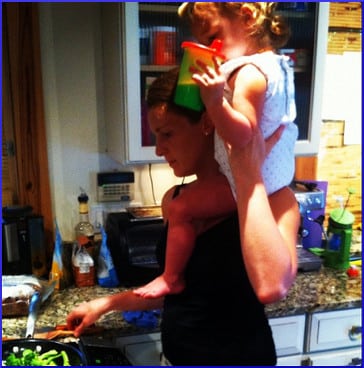
Last time, Childhood Obesity News talked about a controversial public service announcement that Dr. Pretlow discussed in an interview. Many people interpreted the PSA as zeroing in on mothers as the root of the childhood obesity problem. For simplicity’s sake, it’s easier to address mothers as the main nurturers, but of course almost all advice for moms is also for dads, extended family members, day-care workers, and anyone else responsible for putting food into the face of a young human.
Even when mothers are not overtly blamed, they are made to feel like failures. Writing for Patch.com, Lisen Stromberg describes the thought process:
You tell me my kid is obese and two things happen, a) I get defensive because the subtext is I’m not a good mother, and b) I ignore your advice because I don’t want to consider that, as the gate-keeper to my children’s health, I may actually be harming them.
Women have all kinds of complicated feelings about weight and body image, both their own and their children’s. For some women, the modern fitness-conscious mom is a paradigm of self-involvement and narcissism that they don’t want to sign onto. Stromberg says:
For these women, being the mother who provides food and sacrifices herself for her family is more important than her own weight. She doesn’t have time to exercise because what little time she does have, she wants to devote to her children.
Such super-focused mothers may even be aware that example is the best way to teach. But the example they are trying to set for their children is of a mother who stays home, generally in the kitchen, and it doesn’t matter what kind of figure she has because it’s covered up with an apron anyway. The underlying idea is that a true mother is willing to sacrifice herself by “letting herself go,” without realizing that it’s not an either-or proposition. Received wisdom and unquestioned attitudes are what make up a culture, and a culture often prides itself on resistance to change. Stromberg says:
It isn’t as simple as rich vs. poor or white vs. ‘other’. We are hitting women at the heart of their roles as mothers when we tell them their children are obese. We need to find a way to work within their own value system as mothers and women.
The culture in which a mother has been brought up might encourage her, at feeding time, to watch TV rather than concentrate on the baby, and even such small and seemingly unimportant actions make a difference. “Propping” a bottle and leaving an infant alone to drink its milk or formula is seen as harmless in some cultures, while many experts would rather see this practice abandoned. The bottom line is that families of all ethnic backgrounds and races could use a little help in one way or another.
A metastudy conducted by Dr. Tristin D. Brisbois and a team from the University of Alberta looked at 135 relevant studies, comparing 42 variables suspected to be associated with adult obesity. They narrowed it down to seven main early markers. Mothers who smoked and gained too much weight during pregnancy were noted as likely causes, and maternal BMI appears to be a definite cause. Again, rather than being neglectful or uncaring, these mothers might have been operating out of what they considered more important motives than keeping themselves healthy.
Class, or more bluntly, economic status, seems to play a part, and brings to mind an interesting footnote from a previous Childhood Obesity News topic. In this study, the economic difference was confusingly split. Speaking of the effect on unborn babies of electromagnetic fields from cellphones and appliances, Dr. De-Kun Li’s team observed that:
…there was no consistent pattern of MF exposure with family income: women with either low or high family income had lower MF exposure level than women with medium family income.
There are so many ways in which parents can sabotage their children’s heath — using food as a reward for good behavior; being overprotective, negligent, or authoritarian; reacting to stress in unhealthy ways; and many more — and Childhood Obesity News will look at them more deeply.
Your responses and feedback are welcome!
Source: “The Answer To Childhood Obesity? Mothers,” Patch.com, 06/25/12
Source: “Early Childhood Factors ID’d for Predicting Adult Obesity,” DoctorsLounge.com, 12/29/11
Source: “A Prospective Study of In-utero Exposure to Magnetic Fields and the Risk of Childhood Obesity,” Nature.com, 07/27/12
Image by Brian and Mia Elizardi

 FAQs and Media Requests:
FAQs and Media Requests: 












One Response